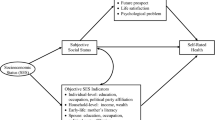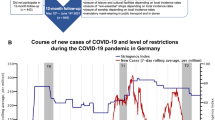Abstract
Purpose
It is well-known that people psychologically adapt to health shocks over time and social participation (SP) has a favourable impact on health. Combining these two understandings, the current study addresses how psychological adaptation to major health shocks was affected by SP experience one year prior to the initial diagnosis.
Methods
Data were collected from a twelve-wave nationwide panel survey conducted from 2005 to 2016, starting with 34,240 individuals aged 50–59 years. Individuals who were initially diagnosed with cancer, stroke, heart disease or diabetes at any time between the second and twelfth waves and kept diagnosed as such were focused on. Random-effects models were estimated to examine how baseline SP prior to the diagnosis affected the pace of change in psychological distress, which was measured using Kessler 6 (K6) scores (range 0–24; M 3.3 SD 4.2), following immediate responses to the initial diagnosis.
Results
Baseline SP enabled or accelerated psychological adaptation to major health shocks. It is noted that the pace of decline of the K6 score per year after the immediate responses was 0.20 for cancer and 0.09 for diabetes (both p < 0.001) among men with baseline SP, in contrast with non-significant and limited changes among those without it. While the results for women were more mixed than those for men, the former results confirmed favourable impacts of baseline SP on psychological adaptation to health shocks in general.
Conclusions
The results highlight a favourable impact of SP on psychological adaptation to health shocks.

Note The differences in the immediate change in K6 score at the initial diagnosis (year 0) reflect the estimated value of β3. The subsequent changes per year in K6 score were projected based on estimated values of β1 (for Non-SP) and β1 + β2 (for SP). The mean of the predicted immediate change in K6 score for those without SP was used as a benchmark for comparison, and all variables other than the years that had elapsed since initial diagnosis were assumed to be unchanged

Note See note to Fig. 1
Similar content being viewed by others
References
Bradford, W. D., & Dolan, P. (2010). Getting used to it: the adaptive global utility model. Journal of Health Economics, 29(6), 811–820.
Damschroder, L. J., Zikmund-Fisher, B. J., & Ubel, P. A. (2005). The impact of considering adaptation in health state valuation. Social Science & Medicine, 61(2), 267–277.
Desmond, D. M., & MacLachlan, M. (2006). Coping strategies as predictors of psychosocial adaptation in a sample of elderly veterans with acquired lower limb amputations. Social Science & Medicine, 62(1), 208–216.
Groot, W. (2000). Adaptation and scale of reference bias in self-assessments of quality of life. Journal of Health Economics, 19(3), 403–420.
Lucas, R. E. (2007). Long-term disability is associated with lasting changes in subjective well-being: evidence from two nationally representative longitudinal studies. Journal of Personality and Social Psychology, 92(4), 717–730.
Luhmann, M., Hofmann, W., Eid, M., & Lucas, R. E. (2012). Subjective well-being and adaptation to life events: a meta-analysis. Journal of Personality and Social Psychology, 102(3), 592–615.
Manne, S., Rini, C., Rubin, S., Rosenblum, N., Bergman, C., Edelson, M., et al. (2008). Long-term trajectories of psychological adaptation among women diagnosed with gynecological cancers. Psychosomatic Medicine, 70(6), 677–687.
Manne, S. L., Myers-Virtue, S., Kashy, D., Ozga, M., Kissane, D., Heckman, C., et al. (2015). Resilience, positive coping, and quality of life among women newly diagnosed with gynecological cancers. Cancer Nursing, 38(5), 375–382.
McNamee, P., & Mendolia, S. (2014). The effect of chronic pain on life satisfaction: evidence from Australian data. Social Science & Medicine, 121, 65–73.
Oswald, A., & Powdthavee, N. (2008). Does happiness adapt? A longitudinal study of disability with implications for economists and judges. Journal of Public Economics, 92(5–6), 1061–1077.
Riis, J., Loewenstein, G., Baron, J., Jepson, C., Fagerlin, A., & Ubel, P. A. (2005). Ignorance of hedonic adaptation to hemodialysis: a study using ecological momentary assessment. Journal of Experimental Psychology: General, 134(1), 3–9.
Binder, M., & Coad, A. (2013). “I’m afraid I have bad news for you … Estimating the impact of different health impairments on subjective well-being. Social Science & Medicine, 87, 155–167.
Anusic, I., Yap, S. C., & Lucas, R. E. (2014). Does personality moderate reaction and adaptation to major life events? Analysis of life satisfaction and affect in an Australian national sample. Journal of Research in Personality, 5, 69–77.
Boyce, C. J., & Wood, A. M. (2011). Personality prior to disability determines adaptation: agreeable individuals recover lost life satisfaction faster and more completely. Psychological Science, 22(11), 183–191.
Buddelmeyer, H., & Powdthavee, N. (2016). Can having internal locus of control insure against negative shocks? Psychological evidence from panel data. Journal of Economic Behavior & Organization, 122, 88–109.
Gignac, M. A., Cott, C., & Badley, E. M. (2000). Adaptation to chronic illness and disability and its relationship to perceptions of independence and dependence. Journals of Gerontology, Series B: Psychological Sciences and Social Sciences, 55(6), 362–372.
Powdthavee, N. (2014). What childhood characteristics predict psychological resilience to economic shocks in adulthood? Journal of Economic Psychology, 45, 84–101.
Wu, S. (2001). Adapting to heart conditions: a test of the hedonic treadmill. Journal of Health Economics, 20(4), 495–507.
Graham, L., & Oswald, A. J. (2010). Hedonic capital, adaptation and resilience. Journal of Economic Behavior & Organization, 76(2), 372–384.
Aside, T., Kondo, N., & Kondo, K. (2016). Social participation and the onset of functional disability by socioeconomic status and activity type: the JAGES cohort study. Preventive Medicine, 89, 121–128.
James, B. D., Boyle, P. A., Buchman, A. S., & Bennett, D. A. (2011). Relation of late-life social activity with incident disability among community-dwelling older adults. Journals of Gerontology. Series A, Biological Sciences and Medical Sciences, 66(4), 467–473.
Kanamori, S., Kai, Y., Aida, J., Kondo, K., Kawachi, I., Hirai, H., et al. (2014). Social participation and the prevention of functional disability in older Japanese: the JAGES cohort study. PLoS ONE, 9(6), e99638.
Tomioka, K., Kurumatani, N., & Hosoi, H. (2017). Association between social participation and 3-year change in instrumental activities of daily living in community-dwelling elderly adults. Journal of the American Geriatrics Society, 65(1), 107–113.
Amagasa, S., Fukushima, N., Kikuchi, H., Oka, K., Takamiya, T., Odagiri, Y., et al. (2017). Types of social participation and psychological distress in Japanese older adults: a five-year cohort study. PLoS ONE, 12(4), e0175392.
Chiao, C., Weng, L. J., & Botticello, A. L. (2011). Social participation reduces depressive symptoms among older adults: an 18-year longitudinal analysis in Taiwan. BMC Public Health, 11, 292.
Fu, R., Noguchi, H., Tachikawa, H., Aiba, M., Nakamine, S., Kawamura, A., et al. (2017). Relation between social network and psychological distress among middle-aged adults in Japan: evidence from a national longitudinal survey. Social Science & Medicine, 175, 58–65.
Bourassa, K. J., Memel, M., Woolverton, C., & Sbarra, D. A. (2017). Social participation predicts cognitive functioning in aging adults over time: comparisons with physical health, depression, and physical activity. Aging & Mental Health, 21(2), 133–146.
Hsu, H. C. (2007). Does social participation by the elderly reduce mortality and cognitive impairment? Aging & Mental Health, 11(6), 699–707.
James, B. D., Wilson, R. S., Barnes, L. L., & Bennett, D. A. (2011). Late-life social activity and cognitive decline in old age. Journal of the International Neuropsychological Society, 17(6), 998–1005.
Glass, T. A., de Leon, C. M., Marottoli, R. A., & Berkman, L. F. (1999). Population based study of social and productive activities as predictors of survival among elderly Americans. British Medical Journal, 319(7208), 478–483.
Väänänen, A., Murray, M., Koskinen, A., Vahtera, J., Kouvonen, A., & Kivimäki, M. (2009). Engagement in cultural activities and cause-specific mortality: prospective cohort study. Preventive Medicine, 49(2–3), 142–147.
Levasseur, M., Richard, L., Gauvin, L., & Raymond, E. (2010). Inventory and analysis of definitions of social participation found in the aging literature: proposed taxonomy of social activities. Social Science & Medicine, 71(12), 2141–2149.
Kessler, R. C., Andrews, G., Colpe, L. J., Hiripi, E., Mroczek, D. K., Normand, S. L., et al. (2002). Short screening scales to monitor population prevalences and trends in non-specific psychological distress. Psychological Medicine, 32(6), 959–976.
Kessler, R. C., Green, J. G., Gruber, M. J., Sampson, N. A., Bromet, E., Cuitan, M., et al. (2010). Screening for serious mental illness in the general population with the K6 screening scale: results from the WHO World Mental Health (WMH) survey initiative. International Journal of Methods in Psychiatric Research, 19(Suppl 1), 4–22.
Furukawa, T. A., Kawakami, N., Saitoh, M., Ono, Y., Nakane, Y., Nakamura, Y., et al. (2008). The performance of the Japanese version of the K6 and K10 in the World Mental Health Survey Japan. International Journal of Methods in Psychiatric Research, 17(3), 152–158.
Sakurai, K., Nishi, A., Kondo, K., Yanagida, K., & Kawakami, N. (2011). Screening performance of K6/K10 and other screening instruments for mood and anxiety disorders in Japan. Psychiatry and Clinical Neurosciences, 65(5), 434–441.
Organisation for Economic Co-operation and Development. (2008). Growing unequal? Income distribution and poverty in OECD countries. Paris: OECD 2008.
Organisation for Economic Co-operation and Development. (2011). Divided we stand: Why inequality keeps rising. Paris: OECD 2011.
Organisation for Economic Co-operation and Development. (2015). In it together: Why less inequality benefits all. Paris: OECD 2015.
Wooldridge, J. (2010). Econometric analysis of cross-section and panel data (2nd edn.). Cambridge: MIT Press.
Funding
This study was funded by the Japan Society for the Promotion of Science (Grant Numbers 17H00991, 18K01657, and 18K19699).
Author information
Authors and Affiliations
Corresponding author
Ethics declarations
Conflict of interest
The authors declare that they have no conflict of interest.
Ethical approval
All procedures performed in studies involving human participants were in accordance with the ethical standards of the national research committee and with the 1964 Helsinki declaration and its later amendments or comparable ethical standards. This article does not contain any studies with animals performed by any of the authors.
Additional information
Publisher’s Note
Springer Nature remains neutral with regard to jurisdictional claims in published maps and institutional affiliations.
Rights and permissions
About this article
Cite this article
Oshio, T., Kan, M. Does social participation accelerate psychological adaptation to health shocks? Evidence from a national longitudinal survey in Japan. Qual Life Res 28, 2125–2133 (2019). https://doi.org/10.1007/s11136-019-02142-8
Accepted:
Published:
Issue Date:
DOI: https://doi.org/10.1007/s11136-019-02142-8




